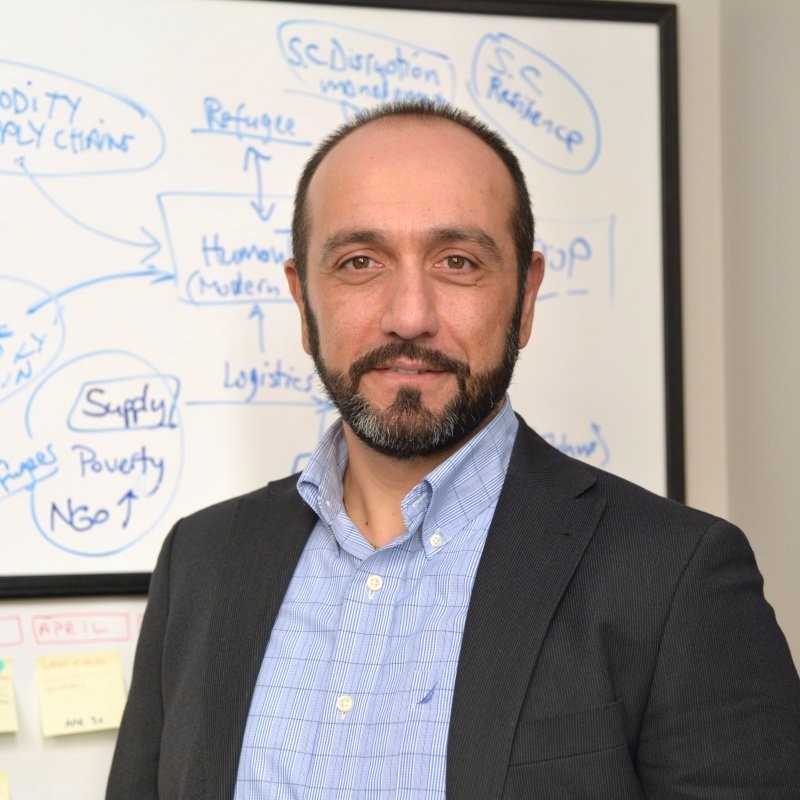In August of 1999, Nezih Altay had everything he wanted. He was in Istanbul, about to marry the woman of his dreams. He was getting his PhD in operations management from a major American university. And up until 3 a.m. on Aug. 17, Altay says he had not witnessed a single day of suffering.
Then in 37 seconds his life changed forever.
A 7.2 magnitude earthquake hit an area just outside of Turkey's capital of Istanbul. It lasted less than a minute, yet more than 17,000 people died, half a million were left homeless and it caused $6.5 billion in damage. Entire neighborhoods were instantly erased as buildings collapsed. Hospitals were overrun with the injured. The country was paralyzed by the quake and the ensuing aftershocks.
Altay and his family escaped to a nearby park. They lived there for days as the country struggled with the disaster's aftermath.
"If there was a distribution scale of lucky to unlucky, I was firmly on the lucky side on that day," Altay says. "But it still leaves a scar. Until that moment I had never been afraid for my life. But the earthquake changed everything."
Learning About the Humanitarian Experience
After the tragedy, Altay tried to return to a normal life. He and his wife had a simple, wedding ceremony and went back to the United States. He raised money for the earthquake victims while earning his PhD in operations management at the University of Texas A&M. He returned to his research focusing on spare parts management. He began teaching courses on operations management. He became a business consultant.
Eventually, Altay went to the University of Richmond to teach future business executives how to manage their supply chain operations.
Yet, the nightmare of Turkey's earthquake and its ensuing disaster response lingered in his memory.

A perpetual learner, Altay began studying the world of disaster relief and humanitarian supply chains. He read about refugee camps and medical supply deliveries after earthquakes, war outbreaks and other devastating disasters. He noticed that concepts in disaster relief supply chain management could be applied to shore up weaknesses in commercial supply chain management.
"When commercial supply chains are hit by a major disruption, they tend to not know what to do with it," Altay says. "One of your suppliers is hit by a major disaster, or dock workers go on strike, so none of your supply ships are leaving the port… these scenarios can send corporations into panic mode."
Humanitarian Experience Informs Business Solutions
Methods ubiquitous in humanitarian supply chain management, such as triage and prioritization, could be used to help commercial operations managers better cope with disruption, Altay theorized. This revelation changed the way he wanted to teach business students about supply chain operations.
"If you solve the problem of a disaster supply chain, you can apply it to commercial logistics, which is easier," Altay says.
Altay struggled to find a university that saw the value of teaching nonprofit humanitarian supply chain lessons to business students. Then, in 2009, he came to DePaul's Driehaus College of Business.
"At DePaul, we're very entrepreneurial," says Altay. "My department chair was supportive and said let's try it and see what happens." This was how Altay's "Managing Humanitarian Supply Chains" course was created.
Eight years later, DePaul undergraduate and graduate business students are watching documentaries on Haiti emergency relief and disaster recovery.They're designing their own mock refugee camps and mapping out ways to supply them. They're traveling to Turkey to witness how that country handles supply chain operations. And, of course, listening to Altay relate his personal experience having survived an earthquake.
"One way of learning is to see a problem in different ways, from different angles. If I wanted to teach you something one way, the solution is easy — memorization," says Altay. "This class allows them to see problems differently and come up with innovative solutions."
Altay's course is now part of the curriculum for DePaul's new MS in Refugee and Forced Migration Studies. The degree program is a cross-disciplinary collaboration among the business college, College of Liberal Arts and Social Sciences and the College of Law. (Learn more about the degree program.)
Injecting Humanitarian Concepts into Supply Chain Lessons
With DePaul's support, Altay has parlayed his personal interest in humanitarian supply chain operations into a growing professional reputation in the field. He's now a renowned expert in disaster relief supply chain logistics, having authored several research papers and headlined panel discussions on the subject.
While his research has given him name recognition, it's his classroom experience that he values the most.
"I love teaching," Altay says. "I can walk into a classroom on any day, and I may be struggling with a cold and not feeling well, but as soon as I walk into that classroom I'm instantly better. I just love teaching students and interacting with them."